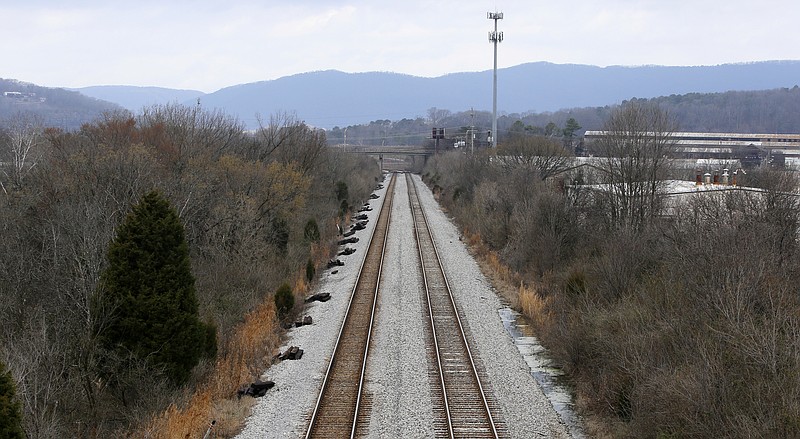NASHVILLE - Tennessee is expected to see nearly $8 billion dollars while at least another $12.2 billion is projected to come to Georgia for projects such as highways, bridges, broadband, airports and clean water under a $1.2 trillion bill expected to be signed by President Joe Biden next week.
The Infrastructure Investment and Jobs Act was given final U.S. House approval last week. The bill passed the Senate in August.
"The bipartisan infrastructure bill will create millions of jobs and make long-overdue investments in Tennessee's infrastructure. It will give us better roads and bridges, faster internet and cleaner drinking water," U.S. Rep. Jim Cooper, D-Nashville, tweeted after the bill's passage.
The bill passed 228-206, largely along party lines, although six Democrats voted against it and 13 Republicans voted for it. In Tennessee and Georgia, all Democrats voted for the bill and all Republicans against it.
"I support infrastructure improvements that improve our community's infrastructure needs," said U.S. Rep. Chuck Fleischmann, R-Ooltewah, in an emailed statement to the Times Free Press. "However, Democrats' multi-trillion bill goes far beyond rebuilding roads and bridges and does nothing to lessen the burdensome federal regulations that suffocate infrastructure projects in Tennessee. While Tennesseans are suffering from 30-year high inflation rates, this is not the time to spend billions we do not have.
"I cannot support a bill that will add to inflation and increase the cost of living for Tennesseans."
U.S. Rep. Marjorie Taylor Greene, R-Rome, castigated the Republicans, mostly from the Northeast and Midwest, who voted to "pass Joe Biden's Communist takeover of America via so-called infrastructure."
U.S. Rep. Scott DesJarlais, R-Sherwood, said in a statement to the Times Free Press, "Last week's infrastructure bill was nothing more than a progressive wishlist full of Green New Deal policies and a tax raise on the middle class."
U.S. Rep. Steve Cohen, D-Memphis, touted the infrastructure measure's expected impact in areas including building safer roads for pedestrians, cyclists and other users.
Kent Starwalt, executive vice president of the Tennessee Road Builders Association, called it the largest single investment in U.S. highway and bridge construction since the enactment of the federal interstate highway program more than a half-century ago.
"We're very appreciative of Congress passing this," Starwalt said Thursday in a Times Free Press telephone interview. "We think it's much needed to help meet the needs that we have with our transportation program.
Starwalt said the additional funding will help the Tennessee Department of Transportation in continuing to build projects identified in the state's 2017 Improve Act.
"So again, we just think it's great. We're looking forward to continue to bid on the projects and help make Tennessee's roads and bridges the best in the nation."
Rail funding
Cohen also touted the $66 billion provision in the infrastructure bill for Amtrak, the nation's passenger rail service, to improve stations and replace older trains. But it's also aimed at expanding Amtrak to additional cities and states.
That includes connecting Atlanta to Memphis, a path that chugs through Chattanooga into Nashville before heading further west.
For more than a century, Chattanooga was a major southern rail hub. Glenn Miller and his orchestra later immortalized the city and its railroad ties in 1941 in the famous song "Chattanooga Choo Choo."
The city once had two passenger rail stations. One was the Terminal Station operated by Southern Railway, which today is the centerpiece of the Chattanooga Choo Choo hotel and entertainment complex. The other was the Union Depot, which belonged to L&N. It closed in 1971, ending passenger rail service for Chattanooga.
In 2020, Amtrak officials met with Gov. Bill Lee administration officials and also spoke before a legislative panel about the possibility of restoring service and coming through Chattanooga.
Contact Andy Sher at asher@timesfreepress.com or 615-255-0550. Follow him on Twitter @AndySher1.
Infrastructure Investment and Jobs Act
Here is how the infrastructure bill, given final approval Nov. 5 by the U.S. House, affects Tennessee and Georgia:Tennessee— $5.8 billion for federal-aid highway formula programs, about a $1.35 billion increase in federal-aid highway funding to the Tennessee Department of Transportation.— $302 million for bridge replacement or rehabilitation.— $697 million for clean water infrastructure, replacing lead pipes to ensure safe drinking water.— $630 million to improve public transportation options in the state.— $300 million for infrastructure development for airports.— $100 million, at least, to help expand or improve broadband internet coverage across the state, including providing access to the 402,000 Tennesseans who lack it.— $88 million to support the expansion of an electric vehicle charging network in Tennessee.— A $66 million provision for Amtrak, which could lead to passenger rail service being restored to Chattanooga and Nashville.— $21 million to protect against cyberattacks.— $17 million to protect against wildfires.Source: White House website, U.S. Rep. Jim Cooper, D-Tennessee.Georgia— $8.9 billion for federal-aid highway formula programs.— $225 million for bridge replacement or rehabilitation.— $913 million for clean water infrastructure, replacing lead pipes to ensure safe drinking water.— $1.4 billion to improve public transportation options across the state.— $619 million for airports.— $100 million, at a minimum, to help expand or improve broadband internet coverage across the state.— $135 million to support electric vehicle charging network across Tennessee.— $24 million to protect against cyberattacks.— $22 million to protect against wildfires.Source: White House website, U.S. Sen. Jon Ossoff, D-Georgia.
